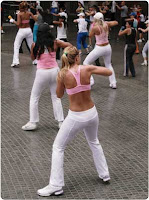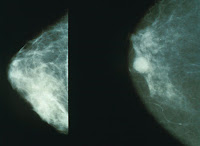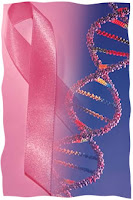 Get this: Up to one third of breast cancer cases can be avoided through diet and fitness. You don’t say? Yes! Eating less and exercising more can reduce the incidence of breast cancer, said experts at the European breast cancer conference in Barcelona yesterday.
Get this: Up to one third of breast cancer cases can be avoided through diet and fitness. You don’t say? Yes! Eating less and exercising more can reduce the incidence of breast cancer, said experts at the European breast cancer conference in Barcelona yesterday.
Although better treatments, early diagnosis and mammogram screenings have dramatically slowed breast cancer, researchers estimate that 25 to 30 percent of cases could be avoided if women were thinner and exercised more. The numbers come from the International Agency for Research on Cancer, which is part of the World Health Organization (WHO). In fact, the WHO estimates that one third of ALL the world’s cancers are preventable.
Please digest this, people: Cancers are preventable. Hmm. One more time: Cancers are preventable. Geez…
 Is this concept a part of our new world health order? Not yet, too avant garde. Let me point out the discrepancy between current medical thinking and the most up-to-date health research and information. This should make us all rest easy since we now have equal access to medical care. Our country’s lawmakers have found it in our best interest to give us more of the system that has brought us medical dependence. We’ll call our current system the “old way,” and the newer, not yet accepted by medical standards (and this includes the Congress and POTUS) approach, the “new way.” Here we go.
Is this concept a part of our new world health order? Not yet, too avant garde. Let me point out the discrepancy between current medical thinking and the most up-to-date health research and information. This should make us all rest easy since we now have equal access to medical care. Our country’s lawmakers have found it in our best interest to give us more of the system that has brought us medical dependence. We’ll call our current system the “old way,” and the newer, not yet accepted by medical standards (and this includes the Congress and POTUS) approach, the “new way.” Here we go.
New way: “What can be achieved with screening has been achieved. We can’t do much more,” Carlo La Vecchia, head of epidemiology at the University of Milan, said in an interview. “It’s time to move on to other things.”
Old way: Any discussion of weight and breast cancer is considered sensitive because some may misconstrue that as the medical establishment blaming women for their disease.
 New way: Dr. Michelle Holmes of Harvard University, who has studied cancer and lifestyle factors, said people might wrongly think their chances of getting cancer depend more on their genes than their lifestyle. “The genes have been there for thousands of years, but if cancer rates are changing in a lifetime, that doesn’t have much to do with genes,” she said.
New way: Dr. Michelle Holmes of Harvard University, who has studied cancer and lifestyle factors, said people might wrongly think their chances of getting cancer depend more on their genes than their lifestyle. “The genes have been there for thousands of years, but if cancer rates are changing in a lifetime, that doesn’t have much to do with genes,” she said.
Old way: Tara Beaumont, a clinical nurse specialist at Breast Cancer Care, a British charity, said her agency has always been careful about giving lifestyle advice. She noted that three of the major risk factors for breast cancer–gender, age and family history–are clearly beyond anyone’s control. “It is incredibly difficult to isolate specific factors. Therefore women should in no way feel that they are responsible for developing breast cancer,” says Beaumont.
New way: Karen Benn, spokeswoman for Europa Donna, a patient-focused breast cancer group, said it is impossible to ignore the increasingly stronger links between lifestyle and breast cancer. “If we know there are healthier choices, we can’t not recommend them just because people might misinterpret the advice and feel guilty,” she said. “If we are going to prevent breast cancer, then this message needs to get out, particularly to younger women.”
Frickin’ duh!
Breast cancer is the most common cancer in women. A woman’s chance of developing breast cancer in her lifetime is one in eight. Obese women are 60% more likely to develop any cancer than normal-weight women. Many breast cancers are fueled by estrogen, a hormone produced in fat tissue, so experts suspect that the fatter a woman is, the more estrogen she’s likely to produce, which in turn could feed breast cancer. Even in slim women, exercise can help reduce the cancer risk by converting more fat into muscle.
Drinking less alcohol might also help lower the risk. Experts estimate that having more than a couple of drinks a day can boost the risk of breast cancer by 4-10%.
Further, searching for magic bullets is counter-productive. There is no one pill or therapy that will make you healthy and live forever. Please wake up. Women who jumped on hormone replacement therapy to bypass the down-side of menopause increased their risk of developing breast cancer. In the ’80s and ’90s breast cancer rose steadily as obesity and the use of estrogen-containing hormones after menopause increased.
A sharp drop in breast cancer rates occurred as women abandoned hormone-replacement therapy due to a discovered link between the treatments and breast cancer. Experts said a similar reduction might be seen if women ate healthier and exercised more.
New way: Dr. Michelle Holmes, the Harvard expert, said changing diet and nutrition is arguably easier than tackling other breast cancer risk factors.
Well no shiitake, Samurai! That’s the new way; yet, we’re still stuck in the old. But at least we’re ALL stuck in it together.












